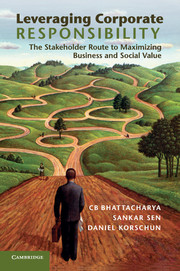Book contents
- Frontmatter
- Contents
- Figures
- Tables
- Exhibits
- Acknowledgements
- One The long and winding road to CR value
- Part I Deconstructing CR value
- Two Viewing stakeholders as individuals
- Three How stakeholders respond to CR
- Part II Inside the mind of the stakeholder
- Part III Putting insight into action
- Appendix Our research program
- Index
- References
Two - Viewing stakeholders as individuals
from Part I - Deconstructing CR value
Published online by Cambridge University Press: 05 June 2012
- Frontmatter
- Contents
- Figures
- Tables
- Exhibits
- Acknowledgements
- One The long and winding road to CR value
- Part I Deconstructing CR value
- Two Viewing stakeholders as individuals
- Three How stakeholders respond to CR
- Part II Inside the mind of the stakeholder
- Part III Putting insight into action
- Appendix Our research program
- Index
- References
Summary
The “Market for Virtue”
The roots of CR have a long and rich history. The idea that businesses can be managed in ways that benefit society dates back to at least the early eighteenth century. In those days “CR” initiatives, in the form of policies and programs helpful to workers, were implemented by industrialists. These were the days of CR's pioneers, idealists who single-handedly pursued a vision of using business to “give back” to society.
For example, Robert Owen was a Welsh-born textile entrepreneur, who in 1799 bought a cotton mill in New Lanark, Scotland so that he could conduct what he called “an experiment” in business practice. Upon purchasing the mill, he instituted a series of socially responsible policies aimed at improving the lives of his workers. He created a fund for those who became sick. He abolished child labor in the factory town. He set up a bank and store to provide services and products at reasonable rates. Owen even started the “Institution for the Formation of Character,” which functioned as a school for both children and adults.
- Type
- Chapter
- Information
- Leveraging Corporate ResponsibilityThe Stakeholder Route to Maximizing Business and Social Value, pp. 27 - 41Publisher: Cambridge University PressPrint publication year: 2011



